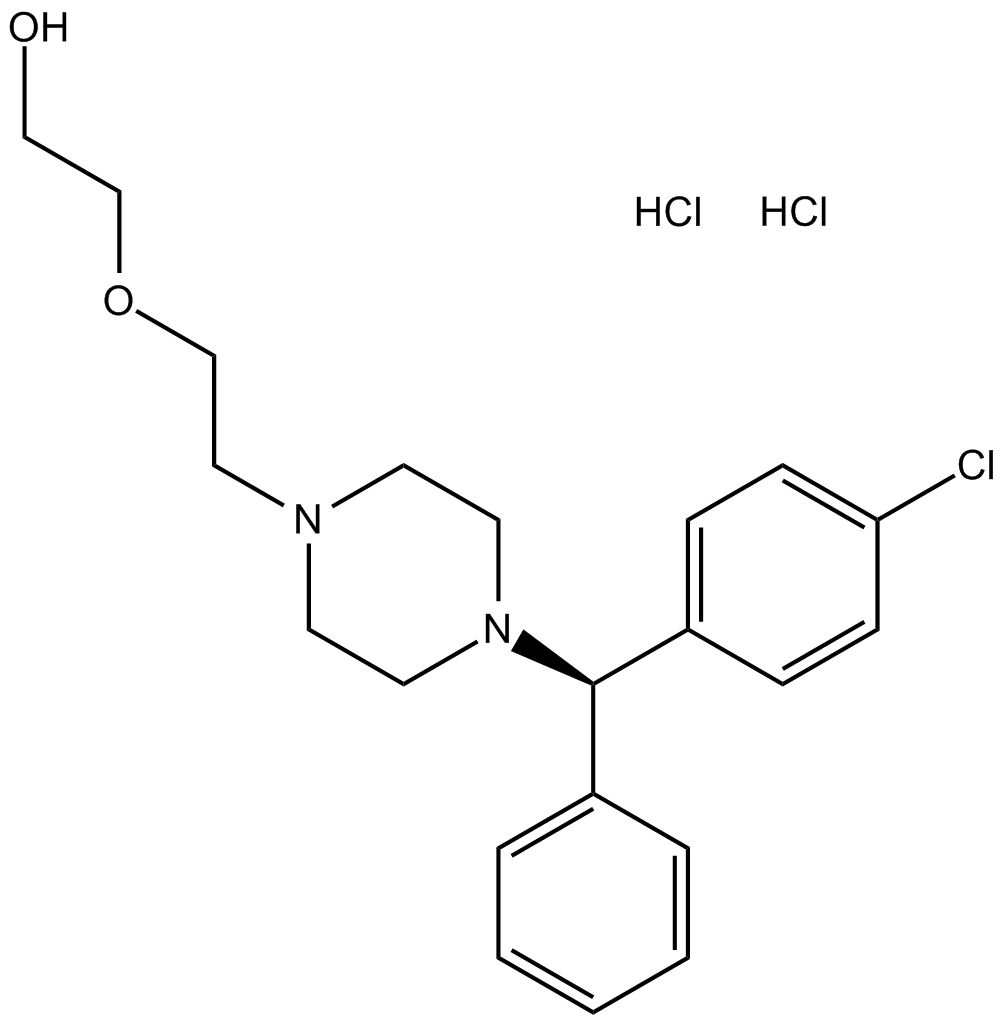Hydroxyzine 2HCl |
| Catalog No.GC10306 |
Hydroxyzine 2HCl, a benzodiazepine antihistamine agent, acts as a orally active histamineH1-receptor and serotonin antagonist.
Products are for research use only. Not for human use. We do not sell to patients.

Cas No.: 2192-20-3
Sample solution is provided at 25 µL, 10mM.
Hydroxyzine dihydrochloride is a histamine H1-receptor antagonist.Target: Histamine H1-ReceptorHydroxyzine dihydrochloride inhibits carbachol (10 μM)-induced serotonin release by 34% at 10 μM, by 25% 1 μM and by 17% 0.1 μM in pretreated bladder slices for 60 min [1]. Hydroxyzine dihydrochloride (0.1 mM) treatment inhibits the progression and severity of EAE by 50% and the extent of mast cell degranulation by 70% in Lewis rats with allergic encephalomyelitis (EAE) [2]. Hydroxyzine dihydrochloride (500 M) significantly increases transport of etoposide to the serosal site in the jejunal everted sacs. Hydroxyzine dihydrochloride significantly reduces the efflux and approximately 2.4 g/mL of etoposide in the jejunum and ileum. Hydroxyzine (0.2 μg/mL) significantly enhances the efflux of RH123 to the lumen [3].Hydroxyzine dihydrochloride (500 μM) significantly decreases the steady-state etoposide concentration 2-fold, where the steady-state concentration reached about 0.055 μM/mL in Sprague-Dawley rats [3]. Hydroxyzine dihydrochloride (12.5 mg/kg, 25 mg/kg and 50 mg/kg i.p.) shows little direct analgesic activity but markedly potentiates only the effect of morphine on the vocalization after-discharge which represents the affective component of pain in rats.Hydroxyzine dihydrochloride (50 mg/kg i.p.) potentiates morphine on the tail-flick test, while Hydroxyzine (12.5 mg/kg i.p.) decreases morphine antinociception in rats [4].
References:
[1]. Minogiannis, P., et al., Hydroxyzine inhibits neurogenic bladder mast cell activation. Int J Immunopharmacol, 1998. 20(10): p. 553-63.
[2]. Dimitriadou, V., X. Pang, and T.C. Theoharides, Hydroxyzine inhibits experimental allergic encephalomyelitis (EAE) and associated brain mast cell activation. Int J Immunopharmacol, 2000. 22(9): p. 673-84.
[3]. Kan, W.M., et al., Effect of hydroxyzine on the transport of etoposide in rat small intestine. Anticancer Drugs, 2001. 12(3): p. 267-73.
[4]. Morichi, R. and G. Pepeu, A study of the influence of hydroxyzine and diazepam on morphine antinociceptoion in the rat. Pain, 1979. 7(2): p. 173-80.
Average Rating: 5 (Based on Reviews and 28 reference(s) in Google Scholar.)
GLPBIO products are for RESEARCH USE ONLY. Please make sure your review or question is research based.
Required fields are marked with *




















